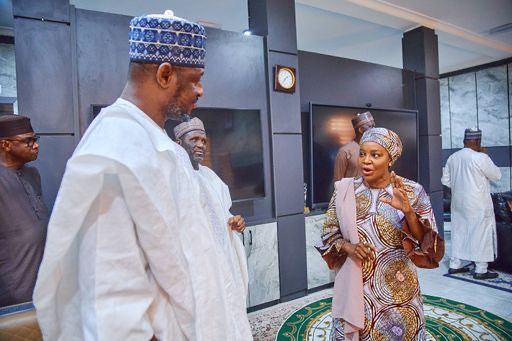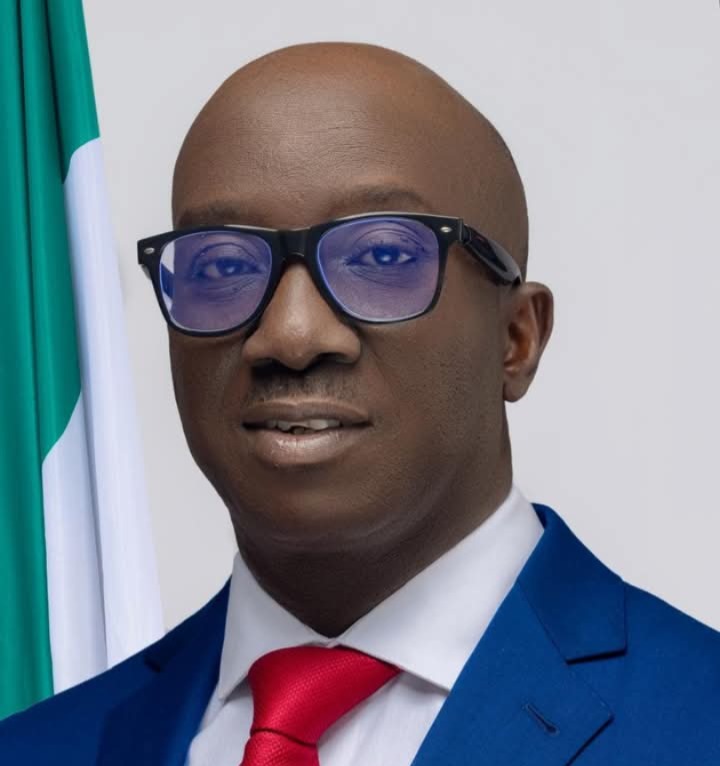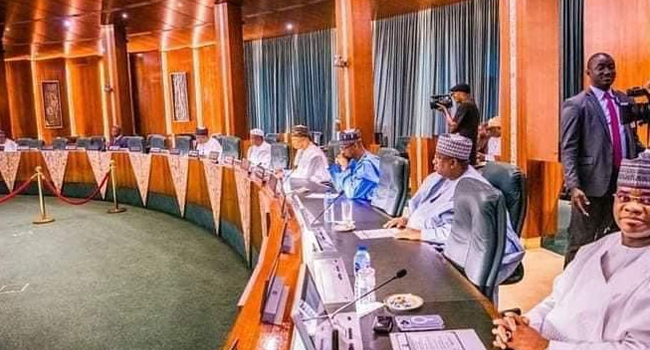Some Senior Advocates of Nigeria, including a former President of the Nigerian Bar Association, Olisa Agbakoba, have tackled the Chairman of the Economic and Financial Crimes Commission, Ola Olukoyede, for suggesting that the judiciary should intervene in matters related to lawyers’ fees.
Olukoyode had on Monday appealed to the judiciary to address the issue of senior lawyers charging exorbitant fees for legal representation to politicians in the country.
He made the statement at the opening of the 6th Annual Criminal Law Review Conference on Monday in Abuja.
Olukoyode stated that lawyers should be mindful of where political officeholders obtain the huge sums of money they use to pay legal fees, as these funds often come from embezzled taxpayer money.
He said, “The judiciary should address the issue of obscene legal fees senior lawyers earn from political office holders, particularly the manner in which they collect such fees which conflict with existing statutes.”
But reacting to the statement on Tuesday, Agbakoba stated that such issues did not fall within the jurisdiction of the EFCC or the judiciary.
“The EFCC chairman has no authority to suggest that the judiciary ought to wade into a matter relating to fees charged by lawyers,” Agbakoba said.
“In truth, this matter does not concern the EFCC, nor does it fall within the remit of these two distinguished institutions,” he added.
Agbakoba, a former president of the Nigerian Bar Association, argued that the judiciary and the EFCC were already faced with significant responsibilities, and legal fees should not add to their burdens.
“Both institutions are saddled with enormous duties that are far more pressing. Legal fees should be the least of their worries,” he said.
Reacting to the EFCC boss’ remarks, Mike Ahamba (SAN), in an interview with The PUNCH, said Olukoyede being a lawyer ought to know that the matter he was raising had nothing to do with the commission.
The lawyer said, “I thought the chairman of the EFCC was a lawyer. If he is a lawyer, he should know that it is not within the competence of lawyers to ask for the source of money they are paid. They only depend on the facts brought before the court by the prosecution and the facts given to them by their clients. Let him come forward with the law if it is this money that is paid to a senior lawyer that will destroy a case.
“It is what you present to the court that will win or destroy a case. He has no business thinking about or talking about how much is paid to a senior lawyer who is presenting. The important thing is for him to present his case to the prosecution. If he has no case he shouldn’t be worried that senior lawyers are coming to defend. It is none of his business.”
He added that oftentimes, “They take people to court without facts and when lawyers now come and accuse them, it begins to result in a quarrel.”
He said, “If someone is evading normal financial procedures, he should do something about it. If he has not arrested any lawyer for going through the wrong process to collect money, he should not talk about it.”
According to him, a lawyer is a man of honour, learning and nobility, and he should realise that after being a chairman of the EFCC, he will still be a lawyer.
“He should stop worrying about how they are paid. The most important thing is what have you brought against the accused person? An example of myself is, I, Mike Ahamba, was detained for six days at the EFCC office in Enugu and when eventually I got out, I sued them, you know what they said in court, that they wanted to find out if an offence has been committed. Is that the way to do things?
“The court fined against them and they haven’t paid till now. They should not be in a hurry to arrest and punish people by detention. You find the facts so that when you pick up somebody you present the facts to him then he may confess. Not when you lock up somebody and say the law has allowed the courts to retain somebody without a plea. It is a pity.”
On his part, Lekan Ojo (SAN), said he was convinced that for as long as there was no law regulating what lawyers – either senior lawyers or junior lawyers – could charge in the area of advocacy, for rendering services, not just legal representation, it could not be said that any or a particular amount is obscene.
“How do you judge that? How do you determine that? Sometimes, during the Obasanjo regime, a very senior lawyer in Nigeria, Chief Afebabalola (SAN), was alleged to have charged as much as N250m when naira was naira for incorporating a company.
“Even in the United Kingdom, there are Kings Counsel now Queens Counsel who charge as much as one million pounds for rendering legal representation in the place of court work depending on the complexity of the case, the number of the days or months that may be required and the experience of the lawyers to handle the cases,” he said.
Ojo added, “In the absence of a legislative enactment, it is difficult to say that a particular amount is obscene. In some other professions, they don’t go to court, architects have what they call it even in the legal profession, but it relates to solicitors’ practice, some litigation work like recovery but how do you determine in advance a senior lawyer who is briefed to handle a presidential election petition; a senior lawyer who is briefed to lead as a lead counsel, in a presidential election petition that the issues involved may transverse all the 36 states on Nigeria?
“How do you regulate that? And in such a situation you always have a team. I have been reliably informed, and I have learnt of senior lawyers constituting a team charging well over one billion. So as far as I am concerned, what is not forbidden by law cannot be regarded as wrong, thank God the EFCC chair used the word obscene not illegal.”
“Also looking at the decision of the Court of Appeal in the case of professor Mike Ozekhome against the EFCC where the Court of Appeal held that a lawyer is not under any duty to start probing, investigating, the source or sources of the fund from which his legal fees has come. In the absence of any actual notice or knowledge or sources of the funds, you know sometimes there could be situations where everyone knows that the source of this fund is questionable but the court of appeal held that a lawyer is not under a duty to start finding out.
“Finding out is just another engagement because how do you even find out? Will you start querying, subjecting your client to cross-examination that this money you are paying me, where did you get it from or do you want to refer him to the EFCC or police to help you probe?”
He said probing the client’s source of income was only possible where there was credible evidence that the lawyer knew that the money that had been used to settle his fees was the proceeds of a crime.
“Take for example now a senator briefing a lawyer to represent him in a case, a senator whose total take home in Nigeria is not less than N20m, now 20 multiplied by 12 gives you N240m. If such a senator gives a lawyer N120 million, can’t a lawyer legitimately assume that N120 million has come from the legitimate income of the senator? Also, take the case of a governorship candidate, everybody knows that the party also contributes. In some cases, it is not even the candidate who may be responsible for the legal fees. I think we must concentrate on some things that are workable.”
Another senior advocate, Kunle Adegoke, said the EFCC chairman is a lawyer and knows very well that the legal profession is premised on “Can Rank Rule.”
“That is the rule that regulates the services of a lawyer. When a client comes to you, you cannot reject him unless there are fundamental rules with facts that you cannot accept them. A lawyer cannot say because you are a politician or a criminal, go away. He has to listen to the client because justice has to be served. Justice must prevail. Even the bible, says that heaven is happy over one repentant sinner than 99 already repentant souls. That’s how justice is,” Adegoke said.
The SAN maintained that every lawyer should have a standard.
He added, “The EFCC chair is a vibrant intelligent young man, if he were to be practicing he would not be able to take all his cases pro bono. He has to pay for his office space, pay for his staff’s welfare because he doesn’t want them to look not well taken care of and people calling him a user, he has to provide for his wife or wives and children and so on.”
He agreed that some lawyers outrightly knew that the source of the fund being used to pay them was of criminal proceeds and went ahead with it, adding, “I don’t support that because such lawyers are criminals too. If you support crime then that makes you a criminal. It will not be appropriate for the EFCC chair to now use that tag to brush every other lawyer.”
Expressing a different view, Professor Itse Sagay (SAN) said he agreed “100 percent” with the EFCC chairman.
According to him, some senior lawyers represent corrupt politicians knowingly.
He said, “When the EFCC and other anti-corruption agencies get to them for this assault on our commonwealth, they now hire top lawyers mainly senior advocates, these senior advocates now share from that money and then use that share to go and bribe judges. That’s what is going on and then you will find that at the end of the day, there are no consequences for stealing the commonwealth of Nigeria. No consequences at all, they are just getting away with it because of that triangular thing.”
He explained, “First, the looter has looted the wealth of the nation, gives a large part of it running into hundreds of millions of naira if not even billions to the senior advocate, the senior advocate has the temerity to now go into judges chambers and start negotiating money that would be paid for any case that comes before them. This is what has been happening and I have already said this in public and at the end of the day, who do you really blame?”
Sagay said he does not really blame the judges too much even though he thinks they have lowered their standards, “I blame those who have gone out to corrupt the judges and I think the way we can recover from this is to first deal with the senior lawyers who have the temerity of entering judges chambers and corrupting them.”
According to him, first, “if we can deal with those ones then the problem will reduce and maybe our judges will rise above what has been happening in the last 14 to 15 years. So I agree the EFCC chairman is right.”
He added, “On a positive note, we have a new Chief Justice of Nigeria, and I believe that she is determined to do something about all these that are going on and we’ve seen some of the actions in the decisions of the NJC recently. So what I will conclude is that we should give her a chance and encourage her. But before now, things have been really bad.”
Similarly, Mrs Titilola Akinlawon (SAN), criticised the EFCC for allegedly questioning the sanctity of lawyer-client privilege.
She described such interference as misplaced, insisting that the relationship between lawyers and their clients is confidential and beyond the scrutiny of any authority.
“The relationship between a client and their lawyer is privileged and cannot be looked into by the judiciary or any other body for that matter.
“If the EFCC cannot look into that relationship, how then can the judiciary do so?” Akinlawon said.
She added that it is the EFCC’s responsibility, not the judiciary’s, to investigate and prosecute cases of financial misconduct.
“How a client makes the money to pay their lawyer’s fees is a matter for the EFCC, not the problem of the judiciary.
“The alleged statement by the EFCC is grossly misplaced. The EFCC should perform its duty to investigate and prosecute anyone culpable of embezzling taxpayers’ money,” she said.

 2 months ago
2
2 months ago
2















 English (US) ·
English (US) ·